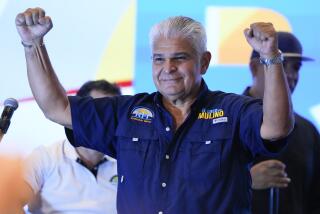Guatemala: Time to Reconcile
- Share via
Guatemalans Sunday elected Alfonso Portillo to lead them into the next century. It was the first presidential election since the signing of peace agreements in 1996 ended more than three decades of civil war.
The challenges that lie ahead are enormous. To succeed, Portillo must push through the National Congress a range of social and economic programs. Eighty percent of the Central American country’s 11 million inhabitants live in extreme poverty, and slightly more than half are either unemployed or underemployed. The indigenous people, who make up 60% of the population, live far from the mainstream; 60% of them speak a language other than Spanish.
The legacies of poverty and war demand that Portillo move promptly on national reconciliation. The bitterness of decades of fratricidal war has left a dark stain from the highlands to the Pacific and Caribbean coasts. Some 150,000 people, mainly poor villagers and members of an Indian resistance movement, were killed in the wars, and 50,000 more are feared dead.
Closely linked to the unresolved issue of national reconciliation is the concern expressed by Guatemalan and international human rights groups over Portillo’s ties to Efrain Rios Montt, the former dictator who was responsible for some of the worst human rights abuses in the early 1980s. Rios Montt remains a player in politics, having won a seat in the National Congress.
Portillo will need international aid to even begin to reverse Guatemala’s tragic situation. The United States and other hemispheric neighbors should move promptly to help.
More to Read
Sign up for Essential California
The most important California stories and recommendations in your inbox every morning.
You may occasionally receive promotional content from the Los Angeles Times.













